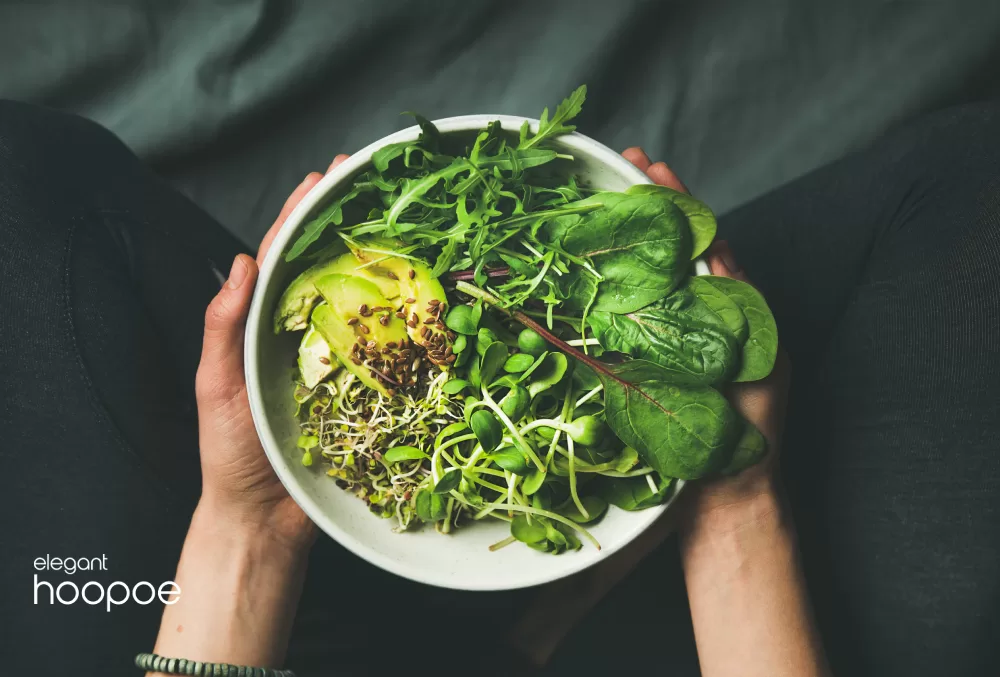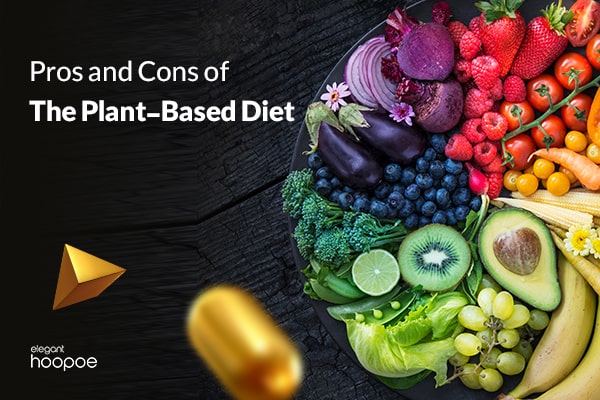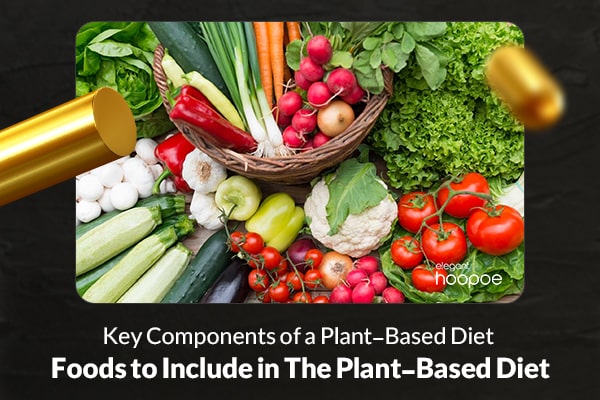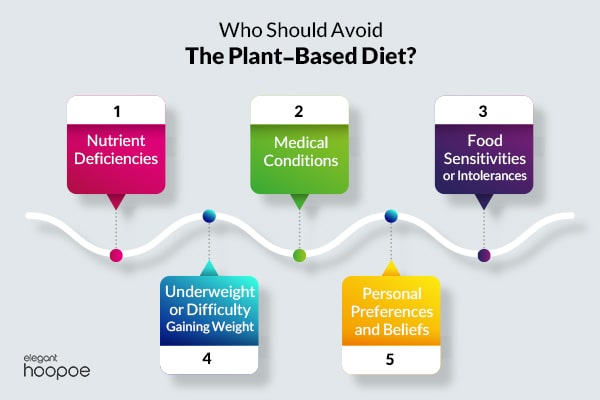The plant-based diet, also known as a plant-forward or plant-centric diet, is one of the best diets for weight loss and has gained significant popularity in recent years. Do you want o know its reason?! people become increasingly aware of the impact of their dietary choices on their health, the environment, and animal welfare. This dietary approach emphasizes the consumption of whole, minimally processed plant foods while minimizing or eliminating the intake of animal products.
What is a Plant-Based Diet?
At its core, a plant-based diet revolves around a rich variety of fruits, vegetables, grains, legumes, nuts, and seeds. It encourages individuals to prioritize these nutrient-dense plant foods as the foundation of their meals while reducing or excluding animal-derived products such as meat, poultry, fish, eggs, and dairy. Some people choose to adopt a fully plant-based lifestyle, excluding all animal products, while others may opt for a more flexible approach by incorporating occasional animal products.

You necessarily do not sacrifice taste, variety, or nutritional adequacy by adopting a plant-based diet. because the availability of plant-based alternatives, innovative recipes, and culinary techniques increasing and you can enjoy a diverse and satisfying range of meals that cater to your nutritional needs.
Read more: What is Volumetric Diet? Free sample plan
The plant-based diet represents a dietary shift towards prioritizing plant foods while minimizing or excluding animal products. In this article of Elegant Hoopoe, we have explained the Pros and Cons, health benefits, the basic tips for starting the Plant-Based Diet, and more. With its potential benefits for health, the environment, and animal welfare, it has emerged as a compelling choice for many individuals seeking a sustainable and ethical approach to food.
How Plant Based diet can help you lose weight?
As we said in the introduction, a plant-based diet is a dietary approach that prioritizes the consumption of plant foods while minimizing or excluding animal products. The diet promotes a shift towards a more sustainable, health-conscious, and environmentally friendly way of eating that centers around plant foods as the foundation of a well-rounded and nourishing diet.
The diet emphasizes foods in their natural state or those that have undergone minimal processing, such as whole grains instead of refined grains and fresh fruits instead of fruit juices to maximize the intake of essential nutrients, fiber, vitamins, minerals, and antioxidants that are abundant in plant foods.

A plant-based diet works by focusing on the consumption of plant foods as the primary source of nutrition while reducing or excluding animal products. It operates on the principle that minimally processed foods derived from plants such as fruits, vegetables, whole grains, legumes, nuts, and seeds can provide all the necessary nutrients for optimal health while offering numerous benefits for the individual and the environment.
Some individuals may choose to include occasional or small amounts of animal products, while others may eliminate them based on personal preferences and individual dietary choices.
Why Some People Choose Plant-based diets?
Its potential health benefits
- Numerous studies have linked plant-based diets to a reduced risk of chronic conditions such as heart disease, type 2 diabetes, certain cancers, and obesity.
- Plant-based diets tend to be rich in fiber, antioxidants, vitamins, and minerals, while often being lower in saturated fat and cholesterol.
Its positive environmental impact
- Animal agriculture is a major contributor to greenhouse gas emissions, deforestation, water pollution, and other environmental issues.
- By reducing reliance on animal products, individuals can significantly reduce their carbon footprint and contribute to the preservation of natural resources.
Its ethical aspect
- Concerns about animal welfare and the ethical implications of factory farming have prompted individuals to explore alternative dietary choices that align with their values.
- By choosing plant-based options, individuals can actively support a more compassionate and sustainable food system.

Pros and Cons of The Plant-Based Diet
The diet has gained significant popularity due to its potential health benefits, positive environmental impact, and ethical considerations.
Another diet plan that has gained quite the popularity in recent years is flexitarian diet and we have explained how this plan can help you lose some pounds in the article
However, there are both pros and cons to consider to make an informed decision based on personal goals, values, and individual health considerations. Some of the pros and cons of the plant-based diet include:
Advantages of plant based diets

- Health benefits: Numerous studies suggest that the diet can lower the risk of chronic diseases such as heart disease, type 2 diabetes, certain cancers, and obesity. It is typically rich in fiber, antioxidants, vitamins, and minerals while being lower in saturated fat and cholesterol.
- Weight management: Plant-based diets, particularly when focused on whole, unprocessed foods, can support weight management and healthy weight loss due to their high fiber content and lower calorie density.
- Environmental sustainability: Plant-based diets have a lower environmental footprint compared to diets rich in animal products. They require fewer resources, such as land, water, and energy, and produce fewer greenhouse gas emissions, contributing to a more sustainable food system.
- Animal welfare: By reducing or eliminating animal products, individuals following a plant-based diet can align their dietary choices with their concerns for animal welfare, supporting a more compassionate approach to food consumption.
- Variety and culinary exploration: Plant-based diets encourage individuals to explore a wide range of fruits, vegetables, whole grains, legumes, nuts, and seeds, leading to increased culinary creativity and a diverse array of flavors and textures in meals.
Disadvantages of plant based diets
- Nutritional considerations: While a well-planned plant-based diet can provide all necessary nutrients, there is a need for attention to certain nutrients, such as vitamin B12, iron, calcium, omega-3 fatty acids, and vitamin D. It may require careful meal planning and potential supplementation to ensure nutritional adequacy.
- Social and practical challenges: Adhering to a plant-based diet can present social and practical challenges in certain settings, such as family gatherings, restaurants, or when traveling. Limited options and lack of familiarity or understanding from others may require additional effort or compromises.
- Potential nutrient deficiencies: If not properly planned, a plant-based diet may result in nutrient deficiencies, particularly in the nutrients mentioned above. It is essential to ensure a balanced intake of key nutrients through a variety of plant-based sources or appropriate supplementation if needed.
- Availability and cost: Depending on geographical location and access to fresh produce and plant-based alternatives, following a plant-based diet may be more challenging or costly for some individuals. Availability and affordability of plant-based options can vary, especially in certain regions.
- Individual preferences and dietary needs: While a plant-based diet can be adaptable, it may not suit everyone’s taste preferences or dietary needs. Some individuals may find it difficult to transition or maintain a plant-based lifestyle due to personal factors, cultural considerations, or specific health conditions.
If you are interested in a type of diet that contains both meat and animal products and vegetables, you might want to learn more MIND diet in this post.
The effects of plant based diets on environment
livestock production, is a significant contributor to greenhouse gas emissions, including carbon dioxide, methane, and nitrous oxide. By reducing or eliminating animal products from the diet, we can significantly lower greenhouse gas emissions, helping mitigate climate change.
Animal agriculture requires large amounts of land for grazing, feed production, and infrastructure. By shifting towards plant-based diets, less land is needed for raising livestock, allowing for the conservation of natural habitats and biodiversity. Additionally, these diets generally require less water compared to animal-based diets, as water is needed for livestock drinking, irrigation of feed crops, and processing.
This industry, is a leading cause of deforestation, as forests are cleared for livestock grazing and feed crop production. Deforestation destroys crucial habitats for wildlife, threatens biodiversity, and contributes to climate change. By reducing the demand for animal products, the diet can help preserve forests and protect vulnerable ecosystems.
Animal agriculture contributes to water pollution through the release of animal waste, antibiotics, and hormones into water bodies. These pollutants can harm aquatic ecosystems, contaminate drinking water sources, and contribute to the growth of harmful algal blooms. Choosing the diet reduces the environmental burden associated with water pollution from intensive livestock farming.
Animal agriculture is energy-intensive, requiring significant amounts of fossil fuels for activities such as feed production, transportation, and processing. By transitioning to a plant-based diet, which requires less energy for crop cultivation and processing, we can conserve energy resources and reduce dependence on fossil fuels.
Embracing plant-based diets encourages a shift towards more sustainable and resilient food systems. It promotes the production of diverse plant foods, including fruits, vegetables, grains, legumes, and nuts, which can be grown using environmentally friendly practices such as organic farming, agroforestry, and regenerative agriculture.

List of the best plant based foods
The key components of a plant-based diet include a variety of plant foods that provide essential nutrients for optimal health. Here are the key components to consider when adopting a plant-based diet:
- Fruits such as berries, citrus fruits, apples, bananas, and melons (They are rich in vitamins, minerals, antioxidants, and fiber)
Recommendation: Consume whole fruits rather than juices to maximize fiber intake.
- Vegetables such as leafy greens (spinach, kale), cruciferous vegetables (broccoli, cauliflower), root vegetables (carrots, sweet potatoes), and others like peppers, tomatoes, and zucchini.
Recommendation: Different colors represent different phytochemicals and nutrients, so strive for a rainbow of vegetables in your diet.
- Whole Grains like brown rice, quinoa, oats, barley, whole wheat, and whole grain bread and pasta. Whole grains provide fiber, B vitamins, minerals, and sustained energy.
Recommendation: Avoid refined grains whenever possible.
- Legumes such as beans (black beans, chickpeas, lentils), peas, and lentils (They are excellent sources of plant-based protein, fiber, iron, and other essential nutrients)
Recommendation: Legumes can be used in soups, stews, salads, and as a meat substitute in various dishes.
- Nuts and Seeds such as almonds, walnuts, chia seeds, flaxseeds, and hemp seeds (They provide healthy fats, protein, fiber, vitamins, and minerals)
Recommendation: Enjoy them as snacks, add them to salads, or use them in cooking and baking.
- Plant-based Protein Sources such as tofu, tempeh, seitan, edamame, and plant-based protein powders (These sources offer a complete amino acid profile)
Recommendation: They can be used in a variety of recipes as alternatives to animal-based proteins.
- Healthy Fats from sources like avocados, olives, nuts, and seeds (These fats provide essential fatty acids and contribute to satiety)
Recommendation: Use plant-based oils like olive oil, coconut oil, or avocado oil for cooking and dressing.
- Replace cow’s milk with plant-based milk and dairy alternatives like almond milk, soy milk, oat milk, or coconut milk.
Recommendation: Look for unsweetened and fortified options that provide calcium and vitamin D.
Finally, enhance the flavor of your dishes with herbs, spices, and natural flavorings. These can include basil, oregano, turmeric, cumin, garlic, ginger, and others, which not only add taste but also provide additional health benefits.
What foods should you avoid in a plant based diet?
When following a plant-based diet, certain foods are typically avoided or limited. Here are some foods to be mindful of:
Animal Products including meat (beef, poultry, pork, lamb), seafood, dairy products (milk, cheese, butter, yogurt), eggs, and honey.
Suggested content: What is Paleo Diet? Is it good for losing weight?
Highly processed meats like deli meats, sausages, hot dogs, and bacon as these products are often high in unhealthy fats, sodium, and additives.
Heavily processed foods such as fast food, sugary snacks, chips, cookies, and sugary beverages as these foods tend to be low in nutritional value and may contain added sugars, unhealthy fats, and artificial additives.
Refined grains such as white bread, white rice, and refined pasta. These grains have been processed, removing the outer bran and germ, which results in a loss of fiber and nutrients. Instead, opt for whole grains like brown rice, quinoa, whole wheat bread, and whole grain pasta.
Foods and beverages with added sugars such as sodas, candies, desserts, and sweetened snacks. Instead, choose naturally sweet options like fresh fruits or opt for small amounts of natural sweeteners like maple syrup or dates.
Foods that contain artificial colors, flavors, and preservatives. These additives are often found in processed foods and may have negative health effects. Opt for whole, minimally processed foods whenever possible.
Foods that contain trans fats or hydrogenated oils, as are associated with various health risks. These fats are often found in processed snacks, fried foods, and some margarine. Check food labels and choose products that are free from trans fats.
Salty snacks, canned soups, and processed foods. Opt for herbs, spices, and other natural flavorings to enhance the taste of your meals instead.
One day plan for the plant-based diet
Breakfast:
- Rolled oats, almond milk, chia seeds topped with fresh berries, sliced banana, and a sprinkle of chopped nuts.
- A cup of herbal tea or black coffee.
Morning Snack:
- A piece of fresh fruit, such as an apple or a handful of grapes.
Lunch:
- Quinoa and black bean salad: quinoa mixed with black beans, diced bell peppers, cherry tomatoes, cucumber, red onion, and fresh cilantro tossed with a dressing made from lime juice, olive oil, and a pinch of cumin.
- Mixed greens or spinach salad with lemon-tahini dressing.
Evening Snack:
- Carrot sticks with hummus or a handful of unsalted nuts.
Dinner:
- Chickpea curry: Sauté diced onion, garlic, and ginger in a pan until fragrant. Add spices like turmeric, cumin, coriander, and garam masala, and cook for a minute. Then add cooked chickpeas, diced tomatoes, and coconut milk. Simmer until the flavors meld together. Serve over brown rice or quinoa.
- Steamed broccoli or roasted vegetables as a side.
Bed-Time Dessert:
- A small bowl of mixed berries with a dollop of coconut yogurt or a piece of dark chocolate.
One week plan of plant based diet for weight loss
Day 1
- Breakfast: Vegan tofu scramble with sautéed vegetables (bell peppers, onions, spinach) and whole grain toast
- Lunch: Quinoa and black bean salad with mixed greens
- Evening Snack: Fresh fruit and a handful of almonds
- Dinner: Lentil curry with brown rice and steamed broccoli
- Bed-Time Dessert: Baked apples with cinnamon and a drizzle of maple syrup
Day 2
- Breakfast: Overnight chia pudding with coconut milk, topped with mixed berries and sliced almonds
- Lunch: Chickpea salad wraps with hummus, mixed vegetables, and whole grain tortilla
- Evening Snack: Carrot sticks with guacamole
- Dinner: Roasted vegetable quinoa bowl with roasted sweet potatoes, Brussels sprouts, and a tahini dressing
- Bed-Time Dessert: Vegan chocolate avocado mousse
Day 3
- Breakfast: Smoothie made with frozen berries, banana, spinach, almond milk, and a tablespoon of nut butter
- Lunch: Mediterranean-style pasta salad with whole wheat pasta, cherry tomatoes, cucumber, olives, and a lemon-tahini dressing
- Evening Snack: Homemade trail mix with dried fruits and mixed nuts
- Dinner: Spaghetti squash with marinara sauce, sautéed mushrooms, and vegan meatballs
- Bed-Time Dessert: Vegan banana bread
Day 4
- Breakfast: Oatmeal topped with sliced bananas, walnuts, and a drizzle of maple syrup
- Lunch: Quinoa and roasted vegetable Buddha bowl with a tahini dressing
- Evening Snack: Rice cakes with almond butter and sliced strawberries
- Dinner: Vegetable stir-fry with tofu, served over brown rice
- Bed-Time Dessert: Baked peaches with a sprinkle of cinnamon
Day 5
- Breakfast: Vegan pancakes with fresh berries and a dollop of coconut yogurt
- Lunch: Black bean and corn salad with mixed greens and a lime-cilantro dressing
- Evening Snack: Homemade kale chips
- Dinner: Stuffed bell peppers with quinoa, black beans, corn, and diced tomatoes
- Bed-Time Dessert: Chia seed pudding with mango puree
Day 6
- Breakfast: Acai bowl topped with granola, sliced fruit, and coconut flakes
- Lunch: Chickpea and vegetable curry with basmati rice
- Evening Snack: Celery sticks with peanut butter
- Dinner: Vegan lentil and vegetable soup with whole grain bread
- Bed-Time Dessert: Vegan lemon bars
Day 7
- Breakfast: Avocado toast with whole grain bread, sliced tomatoes, and a sprinkle of nutritional yeast
- Lunch: Falafel wraps with tahini sauce, mixed greens, and diced cucumbers and tomatoes
- Evening Snack: Edamame beans
- Dinner: Sweet potato and black bean enchiladas with a side of Mexican rice
- Bed-Time Dessert: Mixed berry crumbles with a gluten-free oat topping
Remember to adjust portion sizes according to your individual needs and activity level. Also, make sure to drink plenty of water throughout the day to stay hydrated. This sample meal plan provides a balance of carbohydrates, proteins, healthy fats, and a variety of fruits and vegetables to support a well-rounded plant-based diet. Feel free to modify it based on your personal preferences and dietary requirements.
Essential Nutrients in a Plant-Based Diet for weight loss
A well-planned plant-based diet can provide all the essential nutrients needed for optimal health. However, certain nutrients require attention and may need special consideration when following a plant-based diet, such as:
Protein
Plant-based protein sources include legumes (beans, lentils, peas), tofu, tempeh, seitan, quinoa, nuts, and seeds. Consuming a variety of these protein sources throughout the day can help ensure adequate protein intake.
- Note: Plant-based proteins may be lower in one or more essential amino acids, so combine different protein sources to achieve a complete amino acid profile.
Iron
Plant-based iron sources include legumes, tofu, tempeh, dark leafy greens (spinach, kale), whole grains, nuts, and seeds.
Note: Iron absorption from plant foods can be enhanced by consuming vitamin C-rich foods, such as citrus fruits, berries, and peppers, alongside iron-rich foods. Additionally, avoiding the consumption of tea or coffee with meals can aid in iron absorption.
Calcium
Plant-based calcium sources include fortified plant-based milk alternatives (soy milk, almond milk), calcium-set tofu, fortified orange juice, leafy greens (collard greens, kale, bok choy), sesame seeds, and almonds.
- Note: Ensure adequate calcium intake through a combination of these sources or through the use of calcium supplements, if needed.
Vitamin B12
Vitamin B12 is primarily found in animal-based foods, so it can be challenging for individuals following a strict plant-based diet to obtain sufficient amounts. Fortified plant-based milk alternatives, breakfast cereals, and nutritional yeast are potential sources of vitamin B12 for plant-based eaters.
- Note: Consider vitamin B12 supplementation or fortified foods to ensure adequate intake.
Omega-3 Fatty Acids
Plant-based sources of omega-3 fatty acids include flaxseeds, chia seeds, hemp seeds, walnuts, and algae-based supplements. These sources provide alpha-linolenic acid (ALA), which can be converted to EPA and DHA in the body, although the conversion is not very efficient.
- Note: If consuming enough EPA and DHA is a concern, considering an algae-based omega-3 supplement can be beneficial.
Vitamin D
While sunlight is a natural source of vitamin D, it may be challenging to obtain sufficient amounts, particularly in regions with limited sunlight or during certain seasons. Plant-based vitamin D sources are limited, but fortified plant-based milk alternatives, some breakfast cereals, and mushrooms exposed to ultraviolet light can provide small amounts.
- Note: If vitamin D deficiency is a concern, supplementation or regular testing of vitamin D levels may be necessary.
Zinc
Plant-based sources of zinc include legumes, whole grains, nuts, and seeds. However, phytates present in plant foods can inhibit zinc absorption. Soaking, sprouting, or fermenting these foods can help improve zinc bioavailability.
- Note: If needed, zinc supplementation can be considered under the guidance of a healthcare professional.
Iodine
Iodine is essential for thyroid function and is typically found in seafood and iodized salt.
- Plant-based eaters can obtain iodine through iodized salt, sea vegetables (such as nori or kelp), and iodine-rich supplements.
Fiber
Plant-based diets are naturally high in fiber, which is beneficial for digestive health and can help lower the risk of chronic diseases. Whole grains, legumes, fruits, vegetables, nuts, and seeds are excellent sources of dietary fiber.
Common Misconceptions and Mistakes
One of the most prevalent misconceptions is that plant-based diets lack sufficient protein. However, it’s entirely possible to meet protein needs on a plant-based diet by including sources such as legumes, tofu, tempeh, seitan, quinoa, and nuts. Plant-based proteins can provide all essential amino acids when consumed in adequate amounts and in combination with a variety of plant-based foods.
Some people believe that these diets may lead to nutrient deficiencies. However, with proper planning and attention to nutritional needs, a well-rounded plant-based diet can provide all the necessary nutrients.
Another misconception is that the diet is restrictive and limits food options. On the contrary, a plant-based diet offers a wide range of delicious and diverse foods. Fruits, vegetables, whole grains, legumes, nuts, and seeds provide a vast array of flavors, textures, and culinary possibilities. Exploring new recipes and experimenting with plant-based ingredients can open up a world of exciting and satisfying meals.
Some people worry that the diet may not provide enough calories to meet their needs, especially for athletes or individuals with high activity levels. However, plant-based diets can be easily adjusted to meet energy requirements by incorporating calorie-dense foods such as whole grains, legumes, healthy fats, and starchy vegetables.
Some individuals believe that these diets are bland or lacking in taste. However, plant-based cooking can be incredibly flavorful and satisfying. With the use of herbs, spices, sauces, and creative cooking techniques, plant-based meals can be just as delicious and enjoyable as their animal-based counterparts.
There is a misconception that plant-based diets are more expensive than diets that include animal products. While some specialty plant-based products can be pricey, the diet can be cost-effective when based on whole, unprocessed foods. Staples like grains, legumes, fruits, and vegetables are generally affordable and can be purchased in bulk to save money.

Who Should Avoid The Plant-Based Diet?
While a plant-based diet has numerous health benefits, certain individuals may need to exercise caution or avoid it altogether. Some situations where caution or avoidance of a plant-based diet may be necessary include:
Nutrient Deficiencies
If individuals do not plan their meals carefully or have specific nutritional requirements, may have difficulty meeting their nutrient needs on the diet. This is particularly relevant for nutrients like vitamin B12, iron, calcium, zinc, and omega-3 fatty acids.
If you are facing nutrition deficiency due to following restrict-full diet plans, you should consult with a health care professional on how provide your body with right amount of nutrients. Aplant-based diet might not be the best Idea if you already are facing this condition. There are multiple treatments for this situation from taking oral supplements to injection therapy, however IV therapy or Vitamin infusion is probably the most effective form of treatment as it is fast and safe.
Medical Conditions
People with specific medical conditions, such as certain types of allergies, kidney disease, or gastrointestinal disorders, may require modifications to their diet. For example, those with kidney disease may need to limit high-potassium plant foods, while individuals with celiac disease need to avoid gluten-containing grains.
Food Sensitivities or Intolerances
Some individuals may have allergies, sensitivities, or intolerances to certain plant-based foods. For instance, allergies to nuts, soy, or specific fruits and vegetables may limit food choices within a plant-based diet. In such cases, alternative sources of nutrients should be considered to avoid nutrient deficiencies.
Underweight or Difficulty Gaining Weight
Individuals who are underweight or have difficulty gaining weight may find consuming enough calories on the diet challenging. Plant-based diets can be lower in calorie density, so it’s important to ensure an adequate intake of energy-dense foods like nuts, seeds, and healthy fats to support healthy weight gain.
Personal Preferences and Beliefs
While plant-based diets can be suitable for many individuals, personal preferences, cultural beliefs, or ethical considerations may lead someone to choose a different dietary approach. It’s important to find a diet that aligns with one’s values and is sustainable in the long term.
How to Adapt to a plant based diet for losing weight?

Transitioning to a plant-based diet can be an exciting and rewarding journey. Here are some tips to help you make a successful transition:
- Instead of making sudden and drastic changes, start by incorporating more plant-based meals into your diet. Begin with one or two meatless days per week and gradually increase from there. This gradual approach allows your taste buds and digestive system to adjust.
- Familiarize yourself with a variety of plant-based foods. Experiment with different fruits, vegetables, whole grains, legumes, nuts, and seeds. Try new recipes and cooking methods to discover flavors and textures that you enjoy.
- Learn about the nutritional benefits of a plant-based diet and the importance of balanced meals. Understanding how to meet your nutrient needs with plant-based foods will help you plan your meals effectively.
- Take some time to plan your meals in advance. Create a weekly meal plan and make a grocery list accordingly. Planning ahead can save you time, reduce stress, and ensure that you have all the necessary ingredients for balanced plant-based meals.
- Countless delicious plant-based recipes are available online, in cookbooks, and through mobile applications. Explore different cuisines and experiment with new recipes to keep your meals exciting and satisfying.
- Discover plant-based alternatives for your favorite animal-based foods. There are plant-based milk alternatives, meat substitutes, and even vegan cheeses available in many grocery stores. These alternatives can help ease the transition and make your favorite dishes plant-based.
- Pay attention to getting a variety of nutrients in your meals. Include protein sources like legumes, tofu, and tempeh, incorporate whole grains for carbohydrates, and don’t forget healthy fats from sources like nuts, seeds, and avocados. Fill your plate with a colorful array of fruits and vegetables for vitamins, minerals, and antioxidants.
Notes:
Seek support from like-minded individuals or join online communities and social media groups focused on plant-based eating. Share your experiences, ask questions, and gather inspiration from others who are also transitioning to or following a plant-based diet.
If you are looking for a certified dietitian in Dubai who can provide you with the best possible long term plan based on your needs and health condition then you can contact elegant hoopoe, here at our weight management center, we have gathered the most experienced specialist to help you achieve your ideal body weight.
Every individual is unique, and what works for one person may not work for another. Pay attention to how your body responds to the changes and make adjustments accordingly. If needed, consult with a healthcare professional or registered dietitian to ensure you’re meeting your nutrient needs.
How can plant-based diet help you lose weight?

A plant-based diet can be an effective approach to weight loss due to its emphasis on whole, nutrient-dense foods and lower calorie density. But there are some key points to consider when using a plant-based diet for weight loss, these are:
Focus on Whole, Unprocessed Foods
Base your meals around whole plant foods such as fruits, vegetables, whole grains, legumes, nuts, and seeds. These foods are rich in fiber, vitamins, minerals, and antioxidants while being naturally lower in calories compared to processed foods.
Increase Fiber Intake
These diets are typically higher in dietary fiber, which can help promote feelings of fullness, control appetite, and aid in weight management. Include plenty of fruits, vegetables, whole grains, legumes, and seeds in your diet to increase your fiber intake.
Choose Low-Calorie Dense Foods
Incorporate foods that are low in calories but high in volume. These include non-starchy vegetables like leafy greens, cucumbers, and peppers. These foods can help you feel full and satisfied while consuming fewer calories.
Be Mindful of Portion Sizes
While plant-based foods tend to be lower in calorie density, it’s still important to practice portion control. Be mindful of your portion sizes and listen to your body’s hunger and fullness cues. Eating slowly and savoring your meals can also help prevent overeating.
Suggested Article: What is Sirtfood Diet? How can help you lose more weight?
Limit Added Fats and Oils
While plant-based fats like nuts, seeds, and avocados offer health benefits, they are also calorie-dense. Be mindful of your portion sizes when consuming these foods and consider reducing or limiting the use of added fats and oils in cooking. Instead, try cooking methods like steaming, baking, or sautéing with vegetable broth or water.
Include Plant-Based Protein Sources
Protein is important for weight loss as it helps promote satiety and preserve lean muscle mass. Include plant-based protein sources like legumes, tofu, tempeh, and quinoa in your meals to help meet your protein needs.
Stay Hydrated
Drinking an adequate amount of water throughout the day can help with weight management. Sometimes, thirst can be mistaken for hunger, leading to unnecessary snacking. Stay hydrated to ensure you accurately gauge your body’s hunger signals.
Be Active
While diet plays a significant role in weight loss, incorporating regular physical activity can further support your goals. Find activities you enjoy and aim for a combination of cardiovascular exercises, strength training, and flexibility exercises to promote overall health and weight management.
Comparing the Plant-Based Diet to Other Popular Diets
| Diet | Description | Food Focus | Benefits | Considerations |
| Plant-Based Diet | Emphasizes plant-derived foods and limits or excludes animals | Fruits, vegetables, legumes, whole grains | Rich in fiber, vitamins, minerals, antioxidants | Nutrient planning, potential deficiencies, sourcing protein |
| Mediterranean Diet | Based on traditional dietary patterns in Mediterranean regions | Fruits, vegetables, whole grains, seafood | Heart-healthy fats, antioxidants, moderate wine consumption | May include animal products like fish and dairy |
| Ketogenic Diet | Low-carb, high-fat diet that promotes ketosis | High-fat foods, meat, fish, and eggs | Potential weight loss, improved insulin sensitivity | Restrictive, limited food options, and nutrient deficiencies |
| Paleo diet mimics | Mimics the diet of ancient ancestors | Lean meats, fish, fruits, vegetables | Emphasizes whole foods, high in protein and fiber | Eliminates grains, legumes, dairy, potential nutrient gaps |
| DASH Diet | Dietary Approaches to Stop Hypertension | Fruits, vegetables, whole grains, lean meats | Supports heart health, lowers blood pressure | May include limited animal products, sodium restrictions |
| Flexitarian Diet | Semi-vegetarian approach with occasional meat consumption | Plant-based foods, occasional meat | Plant-rich nutrition, flexibility, reduced environmental impact | Individual meal planning, potential nutrient deficiencies |
| Gluten-Free Diet | Avoids gluten-containing grain | Gluten-free grains, fruits, vegetables | Essential for individuals with celiac disease or gluten sensitivity | Limited food choices, potential nutrient deficiencies |
| Low-Fat diet limits | Limits intake of high-fat foods | Lean proteins, fruits, vegetables | May support weight loss, heart health | Potential nutrient deficiencies, focus on quality of fats |
| Weight Watchers Diet | Point-based system to track and control calorie intake | Balanced approach to all food groups | Portion control, support for weight loss and management | Requires tracking, potential for unhealthy food choices |
Concluding Remarks
A plant-based diet is a way of eating that emphasizes whole, minimally processed plant-derived foods while limiting or excluding animal products. It focuses on fruits, vegetables, whole grains, legumes, nuts, and seeds as the primary sources of nutrition.
By choosing these diets, individuals can enjoy a wide variety of nutrient-dense foods that are rich in vitamins, minerals, antioxidants, and phytochemicals. The diet offers numerous health benefits, including reduced risk of chronic diseases, improved weight management, increased fiber intake, and enhanced overall well-being.
While there are considerations to keep in mind, such as ensuring adequate intake of certain nutrients like vitamin B12 and iron, with proper planning and attention to nutrient sources, the diet can provide all the necessary nutrients for optimal health. It can be adapted to various dietary preferences, including vegan, vegetarian, flexitarian, and more.
A well-planned plant-based diet can be a nutritious and sustainable way of eating, supporting optimal health and contributing to a more sustainable future. It promotes sustainability, animal welfare, and environmental consciousness by reducing the carbon footprint and conserving resources.







